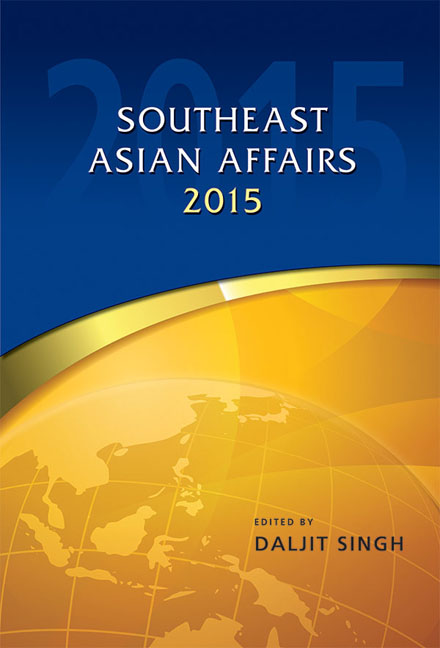Book contents
- Frontmatter
- Contents
- Foreword
- Introduction
- Acknowledgements
- THE REGION
- BRUNEI DARUSSALAM
- CAMBODIA
- INDONESIA
- LAOS
- MALAYSIA
- Malaysia in 2014: A Year of Political and Social Ferment
- The Hudud Controversy in Malaysia: Religious Probity or Political Expediency?
- MYANMAR
- THE PHILIPPINES
- SINGAPORE
- THAILAND
- TIMOR-LESTE
- VIETNAM
The Hudud Controversy in Malaysia: Religious Probity or Political Expediency?
from MALAYSIA
Published online by Cambridge University Press: 19 May 2017
- Frontmatter
- Contents
- Foreword
- Introduction
- Acknowledgements
- THE REGION
- BRUNEI DARUSSALAM
- CAMBODIA
- INDONESIA
- LAOS
- MALAYSIA
- Malaysia in 2014: A Year of Political and Social Ferment
- The Hudud Controversy in Malaysia: Religious Probity or Political Expediency?
- MYANMAR
- THE PHILIPPINES
- SINGAPORE
- THAILAND
- TIMOR-LESTE
- VIETNAM
Summary
Introduction
2014 will be remembered as a year in which the whole Malaysian nation came together in the wake of the double tragedy involving the national carrier Malaysian Airlines, namely the disappearance of MH370 from Kuala Lumpur to Beijing on 8 March, and the shooting down of MH17 over Ukrainian airspace on 17 July, killing all 298 passengers. The two mishaps, while bringing politics to a temporary halt, were not devoid of uncanny political circumstances. The MH370 mystery, in particular, took place on exactly the sixth anniversary of the 12th General Elections (GE12) on 8 March 2008, which changed the course of Malaysian politics when the Anwar Ibrahim-led People's Pact (PR: Pakatan Rakyat) opposition alliance denied the ruling National Front (BN: Barisan Nasional) its coveted two-thirds parliamentary majority and added Penang, Selangor, Kedah and Perak to the list of states it controlled; Kelantan having already been under an Islamic Party of Malaysia (PAS: Parti Islam SeMalaysia)-led government since 1990. The loss of flight MH370 also came immediately following the Court of Appeal's verdict finding Anwar Ibrahim guilty of the charge of sodomizing his former aide Mohd. Saiful Bukhari Azlan. This momentous ruling overturned Anwar's acquittal by the High Court in January 2012, and has had significant implications for Anwar's and PR's political plans for the rest of the year.
The fractious bickering among politicians over the role of Islam, which has been constitutionally designated as the “religion of the Federation” or as many put it, the country's “official religion”, has continued to dominate the political scene since the end of Malaysia's 13th General Elections (GE13) in May 2013. GE13 had witnessed the ruling National Front (BN) coalition losing further ground to PR. Although BN managed to recapture the state of Kedah and legitimize its hold on Perak which it snatched from PR through defections in February 2009, BN's share of parliamentary seats declined from 140 to 133, besides losing the popular vote tally with only 47 per cent of votes as compared to PR's 51 per cent.
Results of GE13 propelled Islam to the forefront of national politics in more ways than one. On the one hand, as a major signifier of Malay ethnicity as formalized in the Federal Constitution, Islam held symbolic value for United Malays National Organization (UMNO), the archetypal party of Malay nationalism.
- Type
- Chapter
- Information
- Southeast Asian Affairs 2015 , pp. 205 - 220Publisher: ISEAS–Yusof Ishak InstitutePrint publication year: 2015



